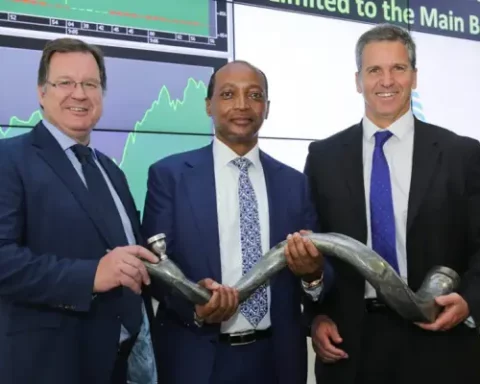Nombasa Tsengwa, who was placed under preliminary suspension as CEO of coal miner Exxaro in December, has gone to court to demand she be reinstated.
This ratchets up the stakes dramatically in one of the more opaque boardroom dramas to hit corporate South Africa in recent years, involving one of the largest coal producers in the country, valued at R53bn on the JSE.
Exxaro’s board, chaired by Geoffrey Qhena, has said only that Tsengwa was suspended over “workplace conduct and governance practices” following a whistleblower report, and that law firm ENS will investigate those claims. The allegation appeared to be that her abrasive style has destabilised the company, leading to the departure of nine executives.
But in the five weeks since her suspension, Exxaro has said nothing – an inauspicious sign, given that the company will now be finalising its accounts for the past year, in which sales volumes are likely to have dropped 2%.
Tsengwa has been barred from speaking to the media, but her lawyer, Eddie Classen, has told Currency that she has gone to court to expedite matters. “We have brought an application in the Pretoria High Court to declare her suspension unlawful and have it set aside,” he says. “The case will be heard on January 28.”
Unusually, but in keeping with the lack of transparency that has characterised this sordid affair, the court file has been sealed. Classen says this is to ensure “certain confidential matters” remain out of the public eye.
While there has been no sign of progress in ENS’s investigation, the law firm is expected to file an answering affidavit next week. Exxaro, investors would expect, should publish ENS’s progress on the stock exchange.
Yesterday, Exxaro’s investor relations head Sonwabise Mzinyathi confirmed to Currency that there is a pending court case.
“The board has taken independent legal advice on this matter and stands by its decision to suspend the CEO to allow for an independent investigation to be properly conducted … the board is fulfilling its fiduciary duty to act in the best interests of the company and will vigorously defend its position in court,” he said.
However, it is not just Tsengwa putting pressure on Exxaro; a group of staff have also delivered a petition signed by 129 people to Qhena’s board asking that she be reinstated.
The petition says Tsengwa’s return is critical, as her “focus on implementation and results-driven strategies positioned the company on a trajectory for success”, which aligns with South Africa’s need for economic growth.
“Despite claims about culture or style, her departure appears orchestrated by influential individuals with conflicting agendas.” It says that if the board wants to address “cultural concerns”, this can be done through other processes that do not compromise Exxaro’s progress.
Mzinyathi said the board “takes note” of that petition, which was “created by an anonymous user of an online petition platform”, pointing out that the petition was only signed by 129 people in a company with 6,900 employees.
One person who signed that petition tells Currency that he has heard nothing yet from the board. “I don’t know what they could say – there is nothing tangible they can put on the table to explain this aggressive act of suspending the CEO of a public company,” he says.
Tsengwa’s suspension capped a tumultuous few months for Exxaro, following an anonymous whistleblower complaint made against her in June last year. That complaint spoke of her “bullying” approach to staff, which allegedly created a hostile work environment.
At the time, the board launched an investigation into her, apparently run by law firm Mdyesha Ndema Attorneys, but Tsengwa was not suspended and was subsequently exonerated. Six months later, however, when a new whistleblower complaint landed in about November, which appeared to revolve around the same issues, the board opted to suspend Tsengwa.
Qhena, however, told Currency in December that the earlier investigation related to “new and different” issues. “New information came to light where other issues were raised, and this was coupled with a whistleblowing complaint,” he said.
Power struggle
What sparked this fallout, those close to Tsengwa say, was her suspension of Exxaro’s head of coal, Kgabi Masia, late last year. They believe Masia has the support of several board members, which triggered Tsengwa’s own suspension days later.
Masia had only been at Exxaro for less than three years, but had an impressive track record: before a three-year stint as a vice-president at South32, he spent 10 years at the world’s largest mining company, BHP Billiton, from 2004.
But staff tell Currency that there was “obvious tension” between him and Tsengwa, which culminated in her suspending him while he was in Switzerland on business, on charges including insubordination.
One person sympathetic to Tsengwa tells Currency that the CEO is being targeted for “cleaning up” some of the more suspect coal deals at Exxaro. “The company spends a lot on the road transportation contracts for coal, but the cost is out of kilter with industry rates. [Tsengwa] has tried to bring these expenses under control,” he says.
Mzinyathi confirmed yesterday that the probe into Masia’s conduct is continuing, and is being conducted by another law firm, Bowmans.
The upshot for Exxaro employees, however, is that this wrangle has created a “horror” environment of fear and mistrust.
“You dare not speak to anyone because you don’t know who will hear about it. Everyone is paranoid, and fearful of what’s going to come out. And no-one at the company wants to make any decisions. So it’s scary right now,” says one employee, who asked not to be named for fear of being victimised.
Tsengwa had “bullied” no-one, that employee says. “I know she was demanding, but she was simply insisting people do their jobs, like any other boss, so I found these claims of bullying to be quite shocking.”
Another employee who spoke to Currency elaborated on the climate of paranoia, saying that staff are fearful of what could happen, or who stands to be suspended on spurious grounds next.
“We’re heading to a financial results season in March, and the CEO is not there. If we go to the results presentation with an acting CEO, it will turn out [to be] a public court about what has happened to Nombasa, and distract all the attention from what we should be talking about. The longer this takes, the more damage will be done to the organisation,” he says.
Asked how much longer this investigation will take, Mzinyathi said the plan is to conclude this “as quickly as thoroughness allows”, and the company’s actions “will be guided by the outcome of the investigations”.
But Tsengwa’s court action shows she is not willing to wait in the background forever. Instead, she has laid down the battle lines against the board to which she would report if her bid to be reinstated succeeds.
Sign up to Currency’s weekly newsletters to receive your own bulletin of weekday news and weekend treats. Register here.









